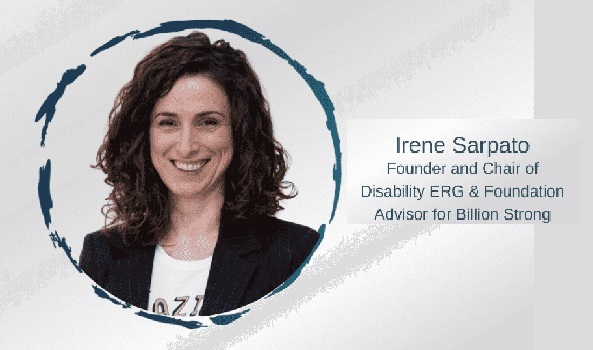Interview by Tiziano Thomas Dossena
Irene Sarpato holds a Degree in Philosophy, specializing in morals, psychology, and human science. She is a Facilitator of the #IamRemarkable workshop, an initiative aimed at empowering women and people from underrepresented groups to celebrate their achievements in the workplace and beyond. She is also the founder and chair of the global disability-based ERG at the company she worked at.
In January 2022, she joined the Global Board of Advisors of Billion Strong Foundation, based in Rockville (Virginia), an identity and empowerment organization designed to bring the billions of voices of persons with disabilities together.
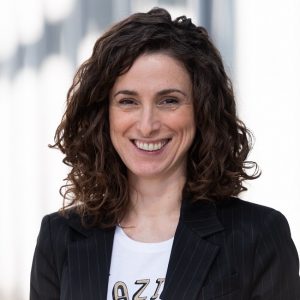
L’Idea Magazine: Hello Irene. Because of your International ties, although you are Italian and live in Italy, I am going to interview you in English, if that’s all right with you… You hold a Degree in Philosophy, specializing in morals, psychology, and human science. What was your dissertation about?
Irene Sarpato: Hello Tiziano, thanks for having me and giving me the opportunity to reach out to the Italian American community. Un caro saluto a tutti e tutte voi!
Yes, my dissertation was on prejudice, discrimination, and social stigma around mental conditions.
My research aimed to assess the effect that theoretical models of the psyche can have on the individual and collective behavior and judgment.
Considering a certain personality paradigm as “normal” and healthy often results in the unacceptability and marginalization of anything that deviates from it. Examples are people with mental conditions or children with school learning peculiarities who, until a few years ago, were kept separate, even physically, from “normals.”
Mental conditions have often been the subject of unjustified and mortifying fears and discrimination. Let us not forget, for example, the extermination program conducted by Hitler against the mentally ill or the harsh regime of segregation and violence that was perpetrated in asylums, of which we have important testimonies from patients such as our Italian poet Alda Merini. In common slang, terms such as “dissociated”, “psycho”, “OCD” are used in a pejorative sense and as an insult.
Thus, history teaches us that the illusion that there is only one reality, and that one reality is better than another, has led to the justification of genocide, segregation, social and racial discrimination, always based on the desire to suppress differences from an absolute paradigm of homogeneity, acquired and shared by a group.
Well, we can reconsider the implicit value judgment if we adopt a psychological model that recognizes the psyche as having a certain malleability, which is sustained by more recent clinical studies highlighting that benign dissociative episodes are, for example, observed even among the nonclinical population and are much more frequent than one might imagine, especially among young people and college students. These include experiences such as absorption (in reading or watching a movie), daydreaming, or having the ability to act in different contexts almost as if one had two different personalities.
Given the frequency of these phenomena, the continuum model is gradually being adopted: dissociation is no longer conceived as an all-or-nothing pattern but as a spectrum.
What is important, then, is to be available to understand the behavior of others and the discomfort it may signal, without any judgment. This disposure can enable us both to broaden our own experience and to be moral therapists for others, who care for their souls. This is also a safe environment to talk about how we feel, while stigma prevents people to seek help.
“Mental conditions have often been the subject of unjustified and mortifying fears and discrimination.”
L’Idea Magazine: You’ve been volunteering in Mental Health Associations as a moral consultant since the age of 18. What prompted this decision of yours?
Irene Sarpato: Mental health is one of my earliest interests, actually. I felt strongly within me the need to support people who suffer from mental health conditions, sometimes abandoned by families, without friends, with great difficulties to lead everyday life, isolated and alone. I thought, “If I were to be in this situation, I would feel very sad and lonely. Let’s start taking care of others, and maybe, if one day I need help, someone will do the same for me.” I wanted to create a virtuous circle of non-specialist, non-therapeutic mutual help and support. I dreamed of a world in which human beings just help each other as one big family.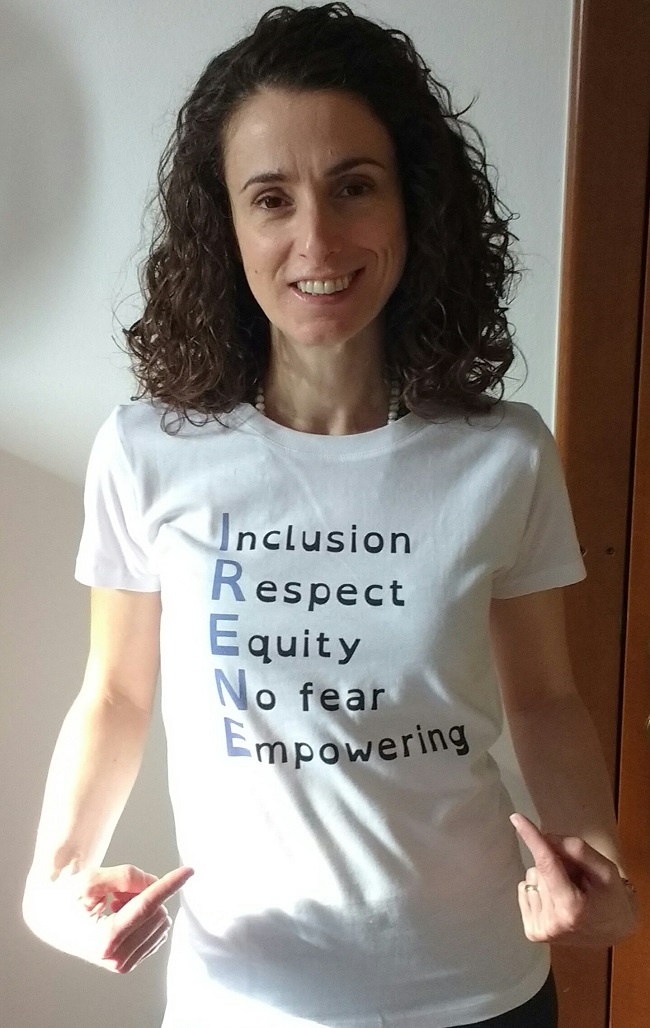
L’Idea Magazine: So, you were concerned about the way society approached disabilities at a young age. Recently you discovered that you were “Asperger’, considered a kind of neural disability. Is that right? Did this discovery amplify your interest in the world of disability?
Irene Sarpato: Precisely. The diagnosis was my aha moment of illumination! I was diagnosed with Asperger’s syndrome (which is in the Autism Spectrum Disorder and considered “high-functioning” autism) a year ago when I was 43 years old. It was not a surprise as much as it was the frame that allowed me to put the pieces of the puzzle in the right place and complete the image of myself, getting to finally know why certain things that for others are so easy and pleasant for me have always been difficult and tiring, and vice versa.
I like my new and complete image very much, which is why I say that I do not experience my condition of a neuroatypical woman like a dis-turb or as a dis-discomfort. I also gladly talk about it in public and in the work environment, share my lived experiences, my achievements, my difficulties, and how I overcame them, putting the coping strategies I built for myself at the disposal of other people. In fact, throughout my life, I have been adding new and useful tools to the toolbox that has supported me in my studies, work, and social interactions, and that has also enabled me to achieve personal and professional goals. Even if, from a medical perspective, I’m not disabled, I identify with this group and my new awareness definitely contributed to amplifying my interest in disabilities and special abilities and my willingness to do something for others.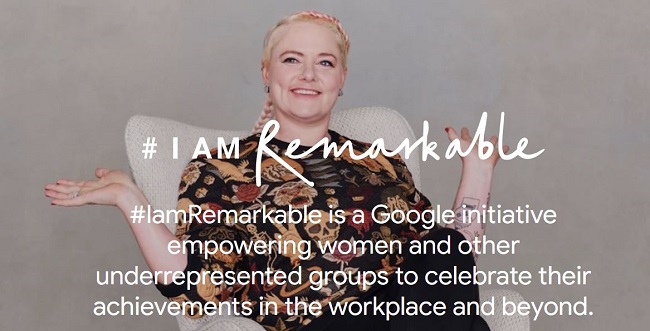
L’Idea Magazine: You are a Facilitator of the #IamRemarkable workshop. What does that mean and entail?
Irene Sarpato: #IamRemarkable is a global initiative by Google, empowering women, and other underrepresented groups to celebrate their achievements.
During the workshop, people develop the confidence to promote themselves in the workplace and personal life, thereby breaking modesty norms and glass ceilings.
During one of the #IamRemarkable workshops I facilitated, I decided to share the personal experience that brought me to #IaR and to let the Remarkable Ladies in the room really get what modesty norms are all about.
When I was a young professional, my manager invited me to a meeting with other managers, all men. I was the specialist and I had to answer questions and provide technical guidance for a project, and that’s what I did, answering all the questions they asked me of which, perhaps by chance, I was sure of the answers.
After the meeting, my manager came back to me and suggested me to “always avoid giving all the answers right away so as not to seem arrogant”. “Better rather pretend not to know or not to have understood the question” he said, and this was “for my own good” of course.
I didn’t get the point at that moment; I was just feeling upset. I was feeling that there was something wrong in those words: why should I pretend not to know if I was the expert invited just to give answers?
If I had attended a #IaR workshop at that time, I would have had the confidence and the right arguments to change that conversation and call out the microaggression. Now I have them, and I am happy to teach them to others who may need them.
“I wanted everyone to feel safe to be themselves in the workplace without hiding parts of their body and mind… teaching colleagues to see the full person, and not only the disability”
L’Idea Magazine: You were the founder and chair of the global disability-based ERG at the company you worked at. When and why did you decide to create this ERG? What exactly does it involve?
Irene Sarpato: It was in 2020, during the Covid 19 pandemic breakout and lockdown. People were feeling isolated and people with disabilities were experiencing amplified fears and worries for their health, new restrictions and barriers to their mobility and independence. Think of deaf people who could no longer read lips because of masks, for example.
I decided to create an ERG of people with disabilities and allies because I wanted to create a net of support for PwD and allies at that moment but, in general, I wanted everyone to feel safe to be themselves in the workplace without hiding parts of their body and mind, experiencing a true sense of belonging. This can be achieved by making sure that disability and mental health become a prominent topic in the workplace, dispelling misconceptions, and teaching colleagues to see the full person, and not only the disability, to build confidence in talking to people with disability and asking questions, thus discovering the full potential and full personality of people with disabilities.
Thus, I founded the ERG “World of Abilities”. Born in Europe, it is expanding worldwide providing members with safe spaces to share and learn from each other, and colleagues with awareness and education events. It also offers business consulting regarding barriers and obstacles to inclusion to be removed, inclusive hiring and career paths, equity and diverse representation in the organization and marketing campaigns, product, and service design, and much more.
L’Idea Magazine: In January 2022, you joined the Global Board of Advisors of Billion Strong Foundation, based in Rockville (Virginia). What does this organization stand for and do?
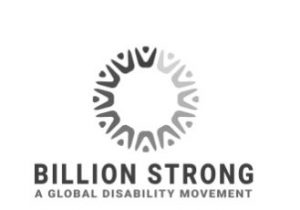 Irene Sarpato: Billion Strong Foundation is based in Rockville (Virginia), and it was founded by an extraordinary woman: Debra Ruh, a globally recognized disability inclusion expert, influencer, speaker, book author, branding expert, successful assistive technology entrepreneur, and exceptional mother of a girl with Down Syndrome.
Irene Sarpato: Billion Strong Foundation is based in Rockville (Virginia), and it was founded by an extraordinary woman: Debra Ruh, a globally recognized disability inclusion expert, influencer, speaker, book author, branding expert, successful assistive technology entrepreneur, and exceptional mother of a girl with Down Syndrome.
Billion Strong is an identity and empowerment organization designed to bring the billions of voices of persons with disabilities together. It is a global movement and a community of persons with lived experiences of disabilities who are willing to drive positive change through the power of togetherness, authenticity, and kindness.
“It’s time to join forces in a global community, aiming at empowerment, a concept that encompasses self-determination, dignity, self-confidence, and positivity.”
L’Idea Magazine: What goals did you have in mind when you joined that organization?
Irene Sarpato: There are many good reasons to join Billion Strong, these are mine:
1.3 billion people in the world live with a form of disability, visible or invisible, thus including mental health conditions. This is 15% of the world’s population, the largest minority in the world according to the WHO.
People with disabilities experience unique obstacles and challenges: physical and digital barriers limit their access to educational, training, recreational, sporting, and employment opportunities, which can undermine their independence, autonomy, and freedom.
Stereotypical narratives still describe disability solely as a disadvantage, a condemnation to a diminished life, a misfortune that prevents full realization. Disability is talked about with pity and paternalism. Too often, people with disabilities have no voice in this narrative, or, perhaps even worse, they are invited to put themselves in the spotlight to inspire people without disabilities who, seeing their example, may think, “As difficult as my life is, it could be worse. That unfortunate person could be me”. That was called “Inspiration Porn” by Stella Young, a comedian, disability advocate, and Editor of ABC’s Ramp Up website, the online space for news, discussion, and opinion about disability in Australia.
Now it’s time to refresh the conversation about disability and change perceptions of it.
It’s time for people with disabilities to take ownership of their own narrative, according to U.S. writer James Charlton’s dictum: “Nothing about us without us”.
It’s time to join forces in a global community, aiming at empowerment, a concept that encompasses self-determination, dignity, self-confidence, and positivity.
Creating a global cultural movement, a support network amplifying success stories, and spreading good practice, committing to the common goals of accessibility and equal opportunities, has never been more important.
L’Idea Magazine: Don’t you feel that sometimes a disability can be an advantage of some sort in a particular field, such as for the main character in the TV series “The Good Doctor”? Do you believe that TV series portrays a realistic environment or is it tweaked to satisfy the audience at large, representing an idealistic environment for an autistic individual, with people always ready to accept, adapt, and help the disabled person?
Irene Sarpato: That’s really tricky, Tiziano. Thanks for your question; it gives me the opportunity to reflect on how the perception around autism is evolving.
Well, let’s start by saying that I love The Good Doctor and I don’t miss an episode. And when I watch it, I do it the aspie way: totally focused on Dr. Shaun Murphy’s challenges and unique abilities!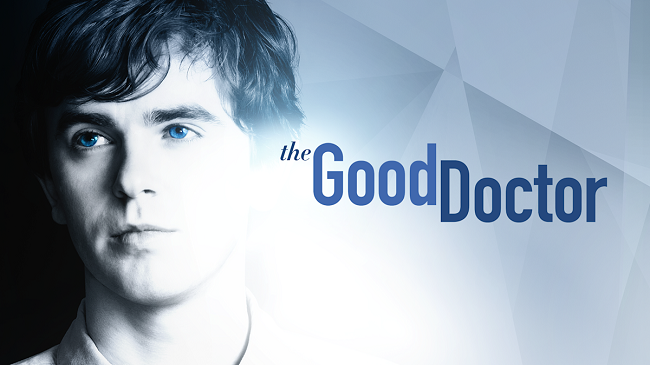
I think the environment as it is described in the series is realistic: the protagonist’s life is not all sunshine and roses (“rose e fiori” as we say in Italy). He had an unhappy childhood, and was bullied and unsupported by his family but then found a mentor, a person who saw his potential and helped him develop it. We would all need to meet someone like that but for people with disabilities and neuroatypical people, it can be even more important to have someone who believes in you and spurs you on to do your best, confront difficult challenges and not give up. And that’s what Shaun does: he tries his best to cope with changes, failures, and difficulties in a demanding and competitive workplace where he finds both supporters and people who would like him out.
On the other side, Dr. Shaun Murphy also has the so-called “Idiot Savant Syndrome” a rare condition that allows him to have far greater intellectual ability compared to the average, together with greater difficulties in emotional and relational areas compared to the average. Same as “Rain Man”.
“Numbers are definitely not my talent; words are.”
Similarly to what I was saying about mental health, when you are not average you are not “normal” and you need to be fixed. So, if you can do one thing better than anyone else and the other things fail you are yes savant in your subject of expertise, but you are idiot in the others, and you remain a clinical case.
There are old and new stereotypes that coexist, Tommaso: the stereotype that autistic people are emotionally and socially inadequate (idiots) is well-known and now the new stereotype that we have above-average intelligence (savants) is rising.
This is not always true. Autistic people are all different and we don’t all have the same type and level of intelligence and the same abilities and difficulties. The new stereotype also raises the bar of expectations for autistic people putting a lot of pressure on them in the workplace, as people assume we are superheroes. Many people ask me if I am a numbers genius: quite the opposite! Numbers are definitely not my talent; words are.
It is good for a series to tell the lived experience of an autistic person, and I recommend that everyone watch it (many people, especially in Italy, don’t even know what autism is and decide to find out about it after watching the series). Just don’t think that autistic people are all like that!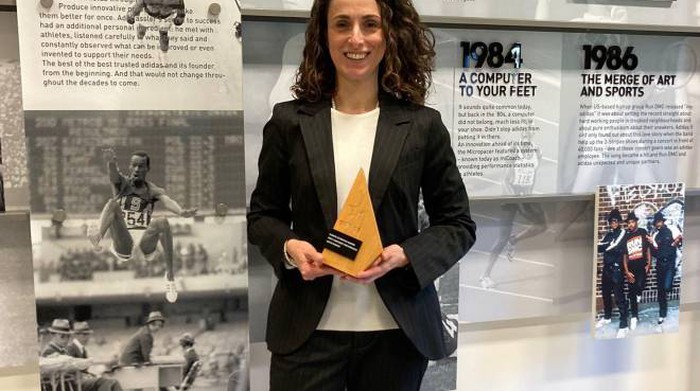
L’Idea Magazine: Do you have any hobbies or pastimes?
Irene Sarpato: I love sports and practice mountain biking, running, and swimming. I do yoga regularly and I recommend it to all autistic people and those struggling with anxiety because it helps a lot to calm down and find one’s emotional balance. I love walking a lot and I do it every day. As soon as I can, I go for long walks in the mountains. Being in contact with nature is very regenerating for me and I love gardening.
L’Idea Magazine: If you had the opportunity to talk to anyone from the past, or even the present, who would that person be, and what would you like to ask them?
Irene Sarpato: I have something to ask Plato, the Greek philosopher born in Athens during the Classical period. It’s something about unwritten doctrines. I would love to have a philosophical dialogue with him!
L’Idea Magazine: Any long-cherished or unfulfilled dream?
Irene Sarpato: I wrote a novel, and finished it just earlier this year. I would be very happy to see it published and distributed in Italian bookstores (and beyond). It is the story of a young neuroatypical woman who tells in her diary how she sees the world and how she lives everyday situations and challenges with a touch of humor. It is not an autobiographical story; it is completely fictional but realistic. I enjoyed writing it, and I think readers would enjoy reading it and gain insights from it about diversity and inclusion in the concreteness of everyday life. I hope this story will interest some Italian or foreign publisher. Fingers crossed!
L’Idea Magazine: A message for our readers?
Irene Sarpato: If you have read this far I can only say Grazie! I hope my long story invites you to keep an open mind and heart to others, even to people who are most different from you, because what makes us unique as individuals also makes us stronger as a community if we know how to listen and support each other.


